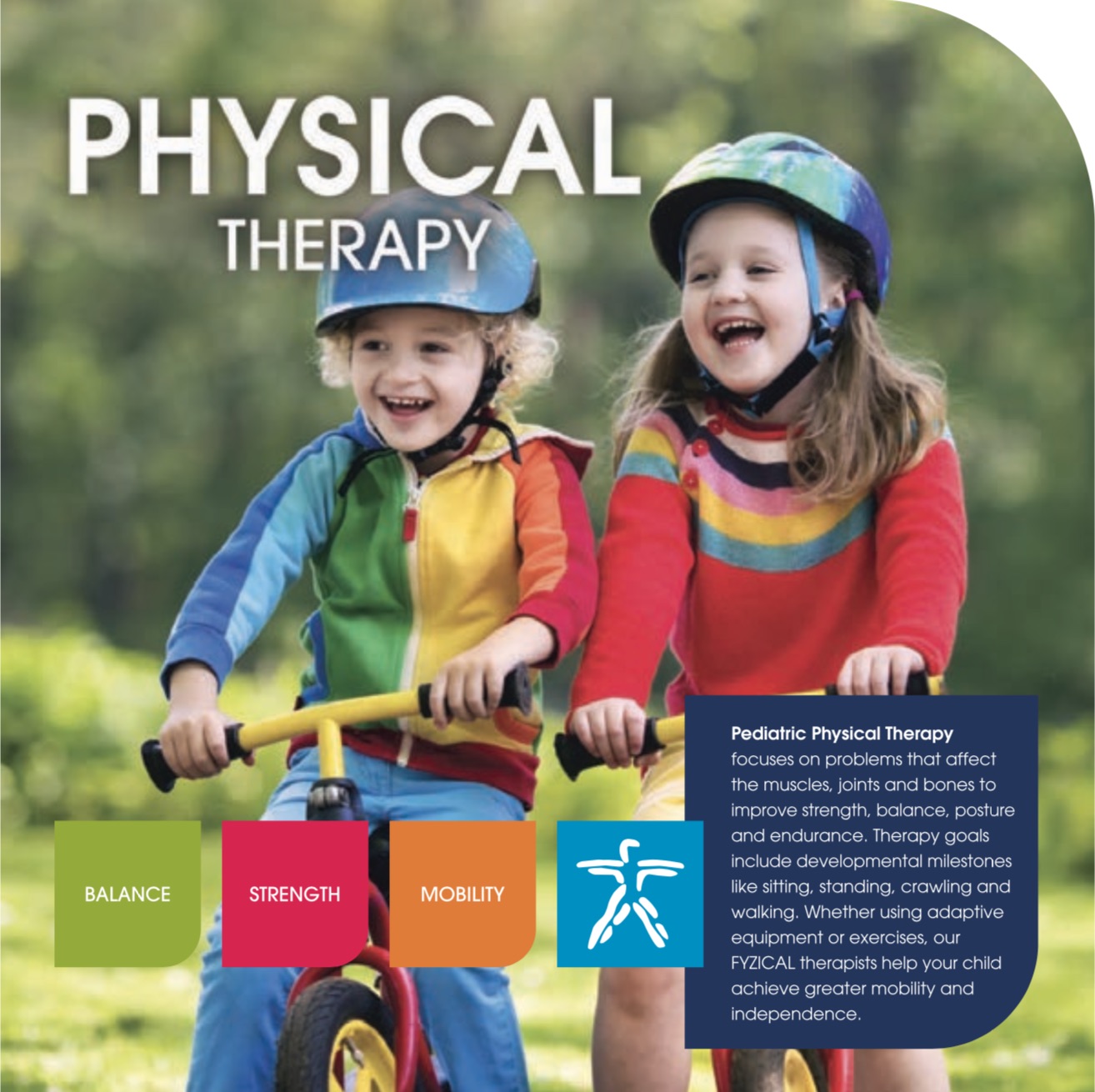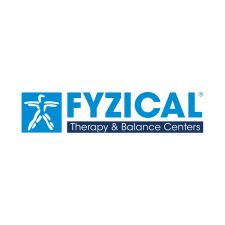Pediatric Physical Therapy
Pediatric Physical Therapy in Woodstock, GA

Do children ever need physical therapy? Yes, they do, and there’s a whole specialty of Pediatric Physical Therapy in Woodstock, GA, dedicated to our young ones. Many kids are born with developmental issues that limit their ability to function as normal adults, while others develop them through injuries or illnesses. The good news is that we have professionals at Fyzical Therapy & Balance Centers, Woodstock, GA, dedicated to improving young kids' lives through physical therapy.
Why Does Your Child Need Pediatric Therapy in Woodstock, GA, at FYZICAL?
-
FYZICAL offers comprehensive Pediatric Physical Therapy as well as:
Our Pediatric FYZICAL Therapists provide skilled evaluation and treatment for children of all ages to help them achieve independent and functional mobility skills. The evaluation includes a parent interview, standardized testing, informal assessment, and play-based interaction to determine the child’s current gross motor abilities. Treatment sessions are individualized and focused on improving balance, postural strength, and motor skills. Home exercise programs are also provided to promote the carryover of skills.
We Specialize In Treating:
- Neurological & Movement Disorders: conditions that arise in the brain from either brain injury, medication, autoimmune disease, infection, or genetic disease that causes a child to move too much or too little. They often result in a repetitive extra movement or sound, involve a shaking tremor, stiffened posture of the muscles, or difficulties with balance and coordination. Common conditions include:
- Ataxia
- Dystonia
- Myoclonus
- Restless Leg Syndrome
- Tourette Syndrome and Tics
- Tremor
- Pediatric Developmental Disorders/Disabilities (PDD): consist of a group of conditions due to an impairment in physical, learning, language, or behavioral areas. About one in six children in the U.S. have one or more developmental disabilities or other developmental delays. Common conditions include:
- Autism Spectrum Disorder
- Attention-Deficit/Hyperactivity Disorder (ADHD)
- Cerebral Palsy
- Developmental Delays
- Genetic conditions (Down Syndrome, Fragile X, Williams Syndrome, Fetal Alcohol Spectrum Disorders)
- Hearing loss
- Intellectual Disabilities
- Learning disorders
- Muscular Dystrophy
- Tourette Syndrome
- Vision impairments
- Orthopedic & Musculoskeletal Conditions: problems with children's bones, muscles, and joints. Common conditions include:
- Back Pain
- Congenital Limb Differences/Limb Length Inequality
- Foot Deformities (club foot)
- Fracture and Trauma
- Generalized impaired strength, motor control, flexibility, endurance, joint motion, and posture
- Hip Dysplasia
- In-toeing
- Legg-Calve-Perthes Disease
- Ligament Injuries (ACL, MCL, etc)
- Meniscus Tears
- Osgood-Schlatter Disease
- Out-Toeing
- Scoliosis & Spine Disorders
- Shoulder Instability
- Slipped Capital Femoral Epiphysis (SCFE)
- Sports-Related Injuries
- Stress Fractures
- Tendonitis
- Torticollis
- Special interests also include wheelchair/seating and mobility
- Neuromuscular Disorders: conditions that affect the nervous system, which includes the brain, spinal cord, and nerves. Common conditions include:
- Cerebral Palsy
- Chiari Malformations
- Congenital anomalies of the brain and spinal cord
- Craniofacial anomalies
- Hydrocephalus
- Muscular Dystrophy
- Osteogenesis Imperfecta (OI)
- Spina Bifida/Myelomeningocele
- Spinal Cord Injury and Paralysis
- Tumors of the brain and spinal cord
- Special interests also include concussion, headache/migraine, metabolic diseases affecting the nervous system, and brain malformations.
- Spina Bifida/Myelomeningocele
- Spinal Cord Injury and Paralysis
- Tumors of the brain and spinal cord
- Special interests also include concussion, headache/migraine, metabolic diseases affecting the nervous system, and brain malformations.
- Coordination and Balance/Vestibular Disorders: all kids, especially toddlers, will stumble and fall. However, your child may have a balance or vestibular problem if you notice a regular pattern of dizziness, blurred vision, clumsiness, and frequent falls. Common neurological (nervous system), auditory (hearing), and vestibular (balance) conditions include:
- Benign Paroxysmal Vertigo of Childhood/BPV
- Central Vestibular Disorders
- Labyrinthitis
- Ménièr's Disease
- Neuritis/Vestibular Neuronitis
- Ototoxicity
- Peripheral Vestibular Disorders
- Systemic Disorders
- Vascular Disorders

What Can You Expect During a Session of Physical Therapy Pediatric in Woodstock, GA?
First, you should understand that the goal of physical therapy in children is to help them move their bodies anytime and anyhow they want to, despite their limitations. However, children are not like adults to whom you can give specific instructions to carry out. Pediatric therapists are well-equipped to handle that problem, and that’s why they engage kids with fun activities that excite them. A typical physical therapy pediatric session in Woodstock, GA, looks like playtime for the kids.
In a session where the focus is on gross motor skills (activities like throwing, walking, and running controlled by large muscle groups in the limbs), kids are encouraged to stand on one foot, run/hop around, balance on a beam, play on large exercise balls, etc. You should keep an eye on these activities as a parent so you can replicate them at home, as instructed by the professional.
At the end of the day, your child should have a better range of motion, endurance, strength, and flexibility.
Frequently Asked Questions
What Is Pediatric Physical Therapy?
Pediatric physical therapy is a specialization that helps children lead better daily lives by teaching them to move at their best how and when they want. Pediatric physical therapists help children with developmental disability improve their strength, endurance, flexibility, range of motion, and movement patterns.
How Do I Know if My Child Needs Physical Therapy?
Your child needs physical therapy pediatric in Woodstock, GA, if they have delays in development (like not walking when appropriate), are recovering from sports-related injuries, have genetic syndromes like Down’s, or have muscle weaknesses or imbalances from conditions like Cerebral Palsy. However, there are several other reasons why your child needs physical therapy, and one way you can be sure is to visit a healthcare professional near you for expert advice. You should contact us at Fyzical Therapy & Balance Centers, Woodstock, GA, for the best service now.
How Is Pediatric Physical Therapy Different from Physical Therapy?
Pediatric physical therapy is a sub-specialty of physical therapy for kids from birth through adolescence. Generally, physical therapy is a field that aims to manage pain and improve movement in people with neurological conditions, traumatic injuries, and other problems.

